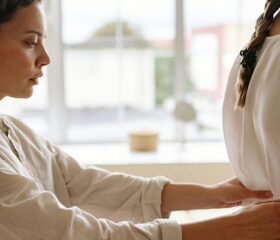Lower Back Pain When Pregnant: When It Starts and What Treatment Is Available
If your lower back has started to ache since you got pregnant, you’re not alone. Back pain is one of the most common complaints during pregnancy.

- When does back pain start during pregnancy?
- What causes lower back pain during pregnancy?
- What types of back pain can you experience when pregnant?
- How to get relief from lower back pain during pregnancy
- What’s the best way to sleep if you have lower back pain during pregnancy?
- When to call your doctor about lower back pain during pregnancy
- When does pregnancy-induced lower back pain get better?
- Final thoughts
Back pain can range from a dull, annoying ache to more intense pain that makes everyday tasks a struggle.
While back pain in pregnancy usually centers on the lower back and hips, it can also affect your middle or upper back, and sometimes may radiate into your legs or buttocks.
Let’s take a look at what causes pregnancy-related back pain, how to tell when it might signify a condition that needs medical attention, and the best ways to ease the ache.
When does back pain start during pregnancy?
Many moms-to-be experience some form of back pain as early as the first trimester. It will probably become more noticeable as your belly grows, peaking in the third trimester.
Many women also experience lingering back pain after they give birth. Fortunately, postpartum discomfort usually fades with rest, recovery, and gentle exercise. 1
What causes lower back pain during pregnancy?
Several pregnancy-induced changes in your body can contribute to back pain:
- Hormonal surges: The pregnancy hormone relaxin loosens the joints and ligaments, particularly in the pelvis. 1 While this hormone is essential to prepare your body for birth, it can lead to joint instability and sore muscles. Progesterone is also a muscle relaxant, which may affect your core strength and posture. 2
- Weakened core muscles: Your abdominal muscles will stretch to make room for your baby, which means they’re less able to support your back. This weakening can leave your lower back muscles doing all the work, leading to strain and potential pain. 3
- Shifting center of gravity: As your belly grows, your body will naturally lean back to stay balanced. Along with increasing the curvature of your lower spine, this will put extra strain on your back muscles, leading to fatigue and soreness. 1
- Weight gain: The pounds you put on during pregnancy, especially if you gain weight rapidly, can also put pressure on your spine, contributing to lower and middle back pain. 2
- Lifestyle factors: Staying sedentary (a big risk if you have a desk job), lacking flexibility, or doing movements that strain your hips and spine can make your discomfort worse. 4
Moreover, in the later stages of pregnancy, if your baby’s head presses against your tailbone or lower back, that can also cause extra back pain, especially if she’s larger than average. 5
What can increase your risk of back pain during pregnancy?
You’re more likely to experience back pain while pregnant if you’ve dealt with it before, either in a previous pregnancy or before you conceived. Your risk is also elevated if you: 5
- Have poor flexibility or weak abdominal muscles
- Are carrying multiples
- Have a high body mass index (BMI)
- Had spinal fusion or back surgery in the past
Is lower back pain a sign of labor?
While lower back pain is common during pregnancy, it can be a sign of labor if it occurs in the third trimester, especially if it’s very intense. 6
In fact, many women experience a very strong form of back pain during labor, known as back labor, which occurs when your baby is in an unusual position for delivery (i.e., with her head pressed against your spine).
You’ll need to monitor your back pain and keep an eye out for the other telltale signs that labor is approaching, such as: 6
- Your water breaking (the bag of fluid surrounding your baby rupturing, which is followed by a steady trickle or gush of liquid)
- Regular contractions that increase in frequency (e.g., every 15 minutes, then every 10 minutes, etc.)
- Pelvic pressure that feels like your baby pressing down on your vagina
Contact your doctor right away if you experience these symptoms—at any point, not just if your baby is due. Lower back pain can be a sign of preterm labor (going into labor before week 37 of your pregnancy). In other words, being far off from your estimated due date doesn’t mean you can’t go into labor. 7
Can you prevent back pain during pregnancy?
Unfortunately, there’s nothing you can do to completely prevent back pain during pregnancy. Keeping your weight at a healthy level and staying in shape can help, but you may still get the occasional backache, even if you do everything “right.” You may need to find ways to manage it rather than prevent it altogether.
What types of back pain can you experience when pregnant?
Not all back pain feels the same. Here are the most common types:
- Posterior pelvic pain: This shows up deep in the buttocks on one or both sides, and may extend to the backs of the thighs. It may get worse with certain movements, like climbing stairs, getting out of the car, or turning over in bed. 8
- Lumbar pain: This is a lower backache that occurs around the waistline. It often gets worse after sitting or standing too long. 1
- Middle or upper back pain: This is less common, but still may occur, especially later in pregnancy or if you’ve gained a significant amount of weight. This pain can come from changes in posture or from carrying tension in your shoulders. 9
What to know about sciatica during pregnancy
Sciatica is a type of nerve pain that’s usually caused by a bulging or herniated disc pressing on the sciatic nerve. It isn’t caused by pregnancy itself, although pregnancy can sometimes aggravate it. 1
It’s hard to miss sciatica when it strikes. 1 The pain will typically start in your lower back or buttocks and shoot down one leg, sometimes all the way to your foot and toes. It may come with tingling, numbness, or a pins-and-needles sensation, and it may feel more intense in the leg than in the back. 1
While many pregnant women experience radiating pain, true sciatica stands out because of how sharply it travels down the leg. Any numbness or weakness in the leg, or pain that worsens with sudden movements like coughing or sneezing, can also point to sciatica.
Because other types of back pain can mimic sciatica, it’s best to talk to your doctor if you suspect you may have sciatica.
How to get relief from lower back pain during pregnancy
Although it’s tricky to completely prevent lower back pain during pregnancy (or middle or upper back pain, for that matter), there are a few ways you can get relief from it if it does strike. For starters, try to maintain proper posture and be conscious of your movements.
When sitting, use a supportive chair with armrests, along with a small pillow or rolled-up towel behind your back. You should also prop your feet on a low stool and avoid crossing your legs. When standing, keep your hips tucked and your shoulders relaxed.
Other ways to relieve your back pain include:
Getting out of bed safely
To avoid straining your back when you get out of bed:
- Roll onto your side
- Bend your knees
- Use your arms to push yourself up to a sitting position
- Swing your legs over the side of the bed and stand up slowly
Avoiding certain movements
Skip activities that involve bending, twisting, or arching. Be especially cautious with exercises or yoga poses that push your hips or spine beyond a comfortable range.
This doesn’t mean avoiding yoga-like workouts entirely while you’re pregnant—to the contrary, prenatal yoga can actually benefit conditions like back pain—but it is important to be careful.
If you have posterior pelvic pain, avoid stairs when possible and take elevators or escalators instead.
Using supportive gear and comfort tools
Depending on the kind of back pain you’re dealing with, it may also be worth investing in items that can give you extra relief.
For instance, low-heeled supportive shoes, like orthotics, will help with alignment and muscle support, and a belly band or support sling can redistribute your weight and ease the strain on your back.
Exercising and stretching
Exercise is a great way to boost your overall well-being during pregnancy, and gentle movement can also combat back pain.
Opt for pregnancy-safe workouts like:
- Pelvic tilts: This is a useful exercise that consists of getting on your hands and knees, inhaling as you arch your back slightly, and tucking your hips. Then, exhale as you return your spine to a neutral position. Repeat this slowly a few times.
- Prenatal yoga: Again, aside from being a great way to destress, yoga helps improve your flexibility, posture, and overall muscle tone.
- Swimming: Swimming is one of the best pregnancy workouts, as it’s a low-impact, full-body workout that takes pressure off your joints while strengthening your back and core.
- Weight training: You can practice light resistance exercises that target your legs, back, and abdominal muscles. Just be sure not to overdo it; opt for lighter weights with more repetitions.
- Stretching: Daily stretches that target the back, hips, and hamstrings can improve your flexibility and relieve tension.
While the above exercises are broadly safe for pregnant women, you should always check with your doctor before trying out a new exercise routine during pregnancy.
Relaxation techniques may help your back pain somewhat
Stress can make back pain worse, and you may find that relaxation techniques like meditation, deep breathing, or guided imagery help you ease your back pain. If you really want to treat yourself, look into a prenatal massage performed by a certified masseuse.
Alternative relief methods
Outside of these tried-and-tested relief methods, many women look to alternative remedies for back pain.
Note that most of these remedies don’t have solid scientific backing. Be sure to run any alternative therapy past your doctor before trying it out.
With that said, many women claim to find relief from back pain with:
- Acupuncture: There is limited research that suggests acupuncture can reduce back pain in pregnancy. 10 However, some medical professionals caution that there isn’t enough research to fully give acupuncture the green light. Ask your doctor about it before trying it.
- Chiropractic care: Some moms claim that regular chiropractic adjustments are helpful, especially when done by a chiropractor with experience in pregnancy care. Adjustments performed by certified chiropractors are generally safe, although here again, there isn’t much scientific evidence for their actual efficacy. 11 12
- Heat and cold therapy: Alternate between cold compresses for inflammation and warm packs for soothing tense muscles. If you plan on using heat pads, keep them on the lowest possible setting and don’t use them for longer than 10 minutes at a time.
Again, chat with your doctor before you start any alternative therapies. They may even be able to put you in touch with a physical therapist who’ll show you how to strengthen your core and back muscles safely.
What’s the best way to sleep if you have lower back pain during pregnancy?
Lower back pain can make it tricky to get enough shut-eye. Many women complain that their back pain is worse at night, since their bodies are working overtime during the day. 5
Make sure you avoid certain sleeping positions during pregnancy (i.e., lying flat on your back) and opt for side-sleeping instead, which will also take the pressure off your back. Experts recommend sleeping on your left side, as this improves blood flow to your uterus. 13
You may also find it helpful to use extra pillows for support. Invest in a comfier mattress if yours feels too hard or soft. 5
When to call your doctor about lower back pain during pregnancy
Back pain is often a normal (and inevitable) part of pregnancy and doesn’t usually signal a problem.
That said, you should bring up any back pain during your next scheduled prenatal checkup. In some cases, certain symptoms can indicate a more serious issue that requires medical attention.
Reach out to your doctor or midwife if you: 14
- Have pain that is severe, getting worse, and doesn’t improve after a couple of weeks of self-care
- Notice numbness, weakness, or tingling in your legs
- Have trouble walking, standing, or moving normally
- Feel pain along one side of your body or in your flank area (this could be a kidney infection) 15
- Have fever, chills, nausea, or blood in your urine
- Experience loss of bladder or bowel control, or numbness around the groin or buttocks
When does pregnancy-induced lower back pain get better?
Final thoughts
If your pregnancy is proving to be a literal pain in the back, take heart in knowing that your aching is temporary.
In the meantime, maintain good posture, engage in moderate exercise, and chat with your doctor if you’re concerned about your lower back pain. Soon enough, you’ll be trading pain for pleasure when you first gaze upon your little bundle of joy.
Article Sources
- Hippokratia. "Pregnancy-related low back pain" Retrieved August 28, 2025.
- University of Rochester Medical Center. "Back Pain in Pregnancy" Retrieved August 28, 2025.
- American College of Obstetricians and Gynecologists. "Back Pain During Pregnancy" Retrieved August 28, 2025.
- University of Rochester Medical Center. "Work and Pregnancy" Retrieved August 28, 2025.
- Cleveland Clinic. "Back Pain During Pregnancy" Retrieved August 28, 2025.
- Nemours KidsHealth. "Are You in Labor?" Retrieved August 28, 2025.
- Marshfield Clinic Health System. "Preterm Labor – Know the Signs and Symptoms" Retrieved August 28, 2025.
- National Health Service. "Pelvic pain in pregnancy" Retrieved August 28, 2025.
- Journal of Physical Therapy Science. "Impact of pregnancy on back pain and body posture in women" Retrieved August 28, 2025.
- Acta Obstetricia et Gynecologica Scandinavica. "Effect of ear acupuncture on pregnancy-related pain in the lower back and posterior pelvic girdle: A multicenter randomized clinical trial" Retrieved August 28, 2025.
- Johns Hopkins Medicine. "Chiropractic Medicine" Retrieved August 28, 2025.
- Clinical Obstetrics and Gynecology. "Chiropractic Care for the Pregnant Body" Retrieved August 28, 2025.
- Sleep Foundation. "Pregnancy Sleep Positions" Retrieved August 28, 2025.
- MedlinePlus. "Low back pain - acute" Retrieved August 28, 2025.
- University of Rochester Medical Center. "Urinary Tract and Kidney Infections in Pregnancy" Retrieved August 28, 2025.







